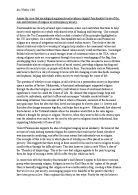Outline and evaluate the view that religion is losing its significance in the contemporary UK. [33mk]
Vasudev Sharan
Lawrence School, Lovedale
Outline and evaluate the view that religion is losing its significance in contemporary UK? [33mk]
An absolute position on, ‘religion is losing its significance in contemporary UK’ is problematic. In other words, any discussion on whether British society is undergoing secularisation is in turn informed by the discussant’s view of religion itself. For instance, if religion is defined in substantive terms (cognate of sacred and supernatural) evidence of secularisation of British society may become more apparent. However, seen from a functionalist perspective, other evidences would become more conspicuous to indicate that religion is still a potent force in British social life.
Sociologists who believe that the British society is undergoing or has undergone significant secularisation are inclined to see that there has been a major displacement of religious belief, practice and sense of community from the moral life of society (Victor Lidz, 1979, Secularisation Ethical Life and Religion in Modern Societies).
Statistics collected pertaining to drop in Church attendance and memberships have been popular evidence for secularisation.
Wilson (2005) reported as against about 13% church attendance of adult population in the 60s it fell to 6.3% in 2005. Gill et al (1998) in a survey found that as against 23% in 1950, 43% in 1996 responded that they were not part of a religion. Young and Wilmott in another research reported that a survey result indicated only 15% of respondents spent their leisure in attending church as against 52% spending such time in a pub. A Home Office Citizenship Survey in 2004 indicated that only 10% of young persons (16-24 yr old) said they ‘belonged to a religion’. For aged 25 to 49 it was 43% and for the over 50s it was 47%. The age bias not withstanding this could be an indicator of the changing role of religion amongst Britons. Terry Sanderson (1999) a spokesman for National Secular Society held that the church is even losing its ‘core business’, that is to ‘hatch’, ‘match’ and ‘dispatch’ (baptise, marry and burry people). Brierley (2001) said, weddings in church are only 40% as against 75% 30 years ago. Baptisation of children in the Church of England in 1930s was 7 out of 10. In 2005 the proportion fell to 1 in 7. Funerals by the same church fell by 11% between 2000 – 2005.



![Outline and evaluate the view that religion is losing its significance in the contemporary UK. [33mk]](https://mbt-essays-prod-public.s3.eu-west-1.amazonaws.com/1211736/listing/1211736_1.jpg)




